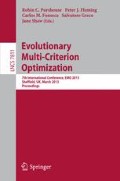Abstract
Instrument identification in polyphonic audio recordings is a complex task which is beneficial for many music information retrieval applications. Due to the strong spectro-temporal differences between the sounds of existing instruments, different instrument-related features are required for building individual classification models. In our work we apply a multi-objective evolutionary feature selection paradigm to a large feature set minimizing both the classification error and the size of the used feature set. We compare two different feature selection methods. On the one hand we aim at building specific tradeoff feature sets which work best for the identification of a particular instrument. On the other hand we strive to design a generic feature set which on average performs comparably for all instrument classification tasks. The experiments show that the selected generic feature set approaches the performance of the selected instrument-specific feature sets, while a feature set specifically optimized for identifying a particular instrument yields degraded classification results if it is applied to other instruments.
Access this chapter
Tax calculation will be finalised at checkout
Purchases are for personal use only
Preview
Unable to display preview. Download preview PDF.
References
Beume, N., Naujoks, B., Emmerich, M.: SMS-EMOA: Multiobjective Selection Based on Dominated Hypervolume. European Journal of Operational Research 181(3), 1653–1669 (2007)
Bischl, B., Mersmann, O., Trautmann, H., Weihs, C.: Resampling Methods for Meta-Model Validation with Recommendations for Evolutionary Computation. Evolutionary Computation 20(2), 249–275 (2012)
Bischl, B., Vatolkin, I., Preuss, M.: Selecting Small Audio Feature Sets in Music Classification by Means of Asymmetric Mutation. In: Schaefer, R., Cotta, C., Kołodziej, J., Rudolph, G. (eds.) PPSN XI. LNCS, vol. 6238, pp. 314–323. Springer, Heidelberg (2010)
Brown, J.C.: Calculation of a constant Q spectral transform. Journal of the Acoustical Society of America 89(1), 425–434 (1991)
Brown, J.C.: Computer identification of musical instruments using pattern recognition with cepstral coefficients as features. Journal of the Acoustical Society of America 105(3), 1933–1941 (1999)
Burred, J.J., Röbel, A., Sikora, T.: Dynamic spectral envelope modeling for timbre analysis of musical instrument sounds. IEEE Transactions on Audio, Speech, and Language Processing 18(3), 663–674 (2010)
Coello Coello, C.A., Lamont, G.L., van Veldhuizen, D.A.: Evolutionary Algorithms for Solving Multi-Objective Problems. Springer, Heidelberg (2007)
Eichhoff, M., Weihs, C.: Musical Instrument Recognition by High-Level Features. In: Proceedings of the 34th Annual Conference of the German Classification Society, pp. 373–381. Springer (2012)
Eronen, A.: Signal Processing Methods for Audio Classification and Music Content Analysis. PhD thesis, Tampere University of Technology, Departmrnt of Signal Processing (2009)
Fiebrink, R., Fujinaga, I.: Feature Selection Pitfalls and Music Classification. In: Proceedings of the 7th International Conference on Music Information Retrieval, ISMIR, pp. 340–341 (2006)
Goto, M., Hashiguchi, H., Nishimura, T., Oka, R.: RWC Music Database: Music Genre Database and Musical Instrument Sound Database. In: Proceedings of the 4th International Conference on Music Information Retrieval, ISMIR, pp. 229–230 (2003)
Guyon, I., Gunn, S., Nikravesh, M., Zadeh, L.: Feature Extraction, Foundations and Applications. Springer (2006)
Jelasity, M., Preuß, M., Eiben, A.E.: Operator Learning for a Problem Class in a Distributed Peer-to-Peer Environment. In: Guervós, J.J.M., Adamidis, P.A., Beyer, H.-G., Fernández-Villacañas, J.-L., Schwefel, H.-P. (eds.) PPSN VII. LNCS, vol. 2439, pp. 172–183. Springer, Heidelberg (2002)
Kitahara, T., Goto, M., Komatani, K., Ogata, T., Okuno, H.G.: Instrument identification in polyphonic music: Feature weighting to minimize influence of sound overlaps. EURASIP Journal on Advances in Signal Processing (2007)
Lartillot, O., Toiviainen, P.: MIR in Matlab (ii): a Toolbox for Musical Feature Extraction from Audio. In: Proceedings of the 8th International Conference on Music Information Retrieval, ISMIR, pp. 127–130 (2007)
Livshin, A., Rodet, X.: The significance of the non-harmonic “noise” versus the harmonic series for musical instrument recognition. In: Proceedings of the 7th International Conference on Music Information Retrieval, ISMIR, pp. 95–100 (2006)
Park, T.H.: Introduction to Digital Signal Processing: Computer Musically Speaking. World Scientific (2010)
Quinlan, J.R.: C4.5: Programs for Machine Learning. Morgan Kaufmann (1993)
Vatolkin, I., Theimer, W., Botteck, M.: AMUSE (Advanced MUSic Explorer) - A Multitool Framework for Music Data Analysis. In: Proceedings of the 11th International Society for Music Information Retrieval Conference, ISMIR, pp. 33–38 (2010)
Vatolkin, I., Preuß, M., Rudolph, G.: Multi-Objective Feature Selection in Music Genre and Style Recognition Tasks. In: Proceedings of the Genetic and Evolutionary Computation Conference, GECCO, pp. 411–418. ACM Press (2011)
Vatolkin, I., Preuß, M., Rudolph, G., Eichhoff, M., Weihs, C.: Multi-objective evolutionary feature selection for instrument recognition in polyphonic audio mixtures. Soft Computing - A Fusion of Foundations, Methodologies and Applications 16(12), 2027–2047 (2012)
Wu, J., Vincent, E., Raczyński, S.A., Nishimoto, T., Ono, N., Sagayama, S.: Polyphonic Pitch Estimation and Instrument Identification by Joint Modeling of Sustained and Attack Sounds. IEEE Journal of Selected Topics in Signal Processing 5(6), 1124–1132 (2011)
Zitzler, E., Thiele, L.: Multiobjective Optimization Using Evolutionary Algorithms - A Comparative Case Study. In: Eiben, A.E., Bäck, T., Schoenauer, M., Schwefel, H.-P. (eds.) PPSN V. LNCS, vol. 1498, pp. 292–301. Springer, Heidelberg (1998)
Author information
Authors and Affiliations
Editor information
Editors and Affiliations
Rights and permissions
Copyright information
© 2013 Springer-Verlag Berlin Heidelberg
About this paper
Cite this paper
Vatolkin, I., Nagathil, A., Theimer, W., Martin, R. (2013). Performance of Specific vs. Generic Feature Sets in Polyphonic Music Instrument Recognition. In: Purshouse, R.C., Fleming, P.J., Fonseca, C.M., Greco, S., Shaw, J. (eds) Evolutionary Multi-Criterion Optimization. EMO 2013. Lecture Notes in Computer Science, vol 7811. Springer, Berlin, Heidelberg. https://doi.org/10.1007/978-3-642-37140-0_44
Download citation
DOI: https://doi.org/10.1007/978-3-642-37140-0_44
Publisher Name: Springer, Berlin, Heidelberg
Print ISBN: 978-3-642-37139-4
Online ISBN: 978-3-642-37140-0
eBook Packages: Computer ScienceComputer Science (R0)

